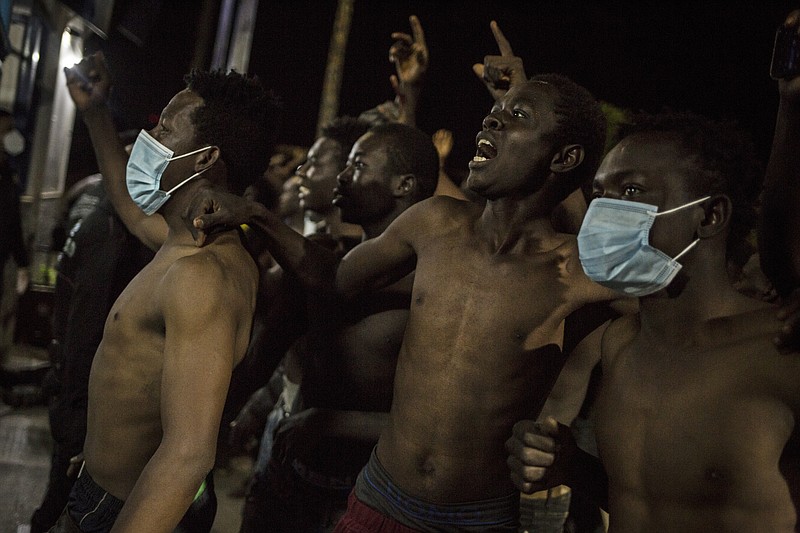CEUTA, Spain -- Spain deployed its military to the Moroccan border Tuesday and expelled nearly half of the thousands of migrants who jumped fences or swam onto European soil over two days after Morocco loosened border controls during a deepening diplomatic spat.
Overwhelmed soldiers separated the adults from the young while Red Cross workers helped an endless trickle of migrants who were emerging from the water shivering and exhausted.
The sudden influx of migrants has fueled the diplomatic spat between Spain and Morocco over the disputed Western Sahara region and created a humanitarian crisis for Ceuta, the Spanish city of 85,000 in North Africa on the Mediterranean Sea, separated from Morocco by a double-wide, 32-foot fence.
Interior Minister Fernando Grande-Marlaska denied that unaccompanied migrants under 18, who are allowed to remain legally in Spain, were being deported.
Spanish Prime Minister Pedro Sanchez canceled a trip to Paris, where he was to attend a summit on international aid to Africa, and flew by helicopter to Ceuta. While calling Morocco a "friend of Spain," Sanchez also urged authorities to "respect the shared border."
A senior Moroccan Foreign Ministry official said the government had recalled its ambassador to Spain for consultations. The official wasn't authorized to be identified by name in media reports.
By Tuesday afternoon, nearly 8,000 people had crossed the border into the city since early Monday, the Spanish government said, including some 2,000 thought to be teenagers. The number getting in slowed after Spain deployed additional police officers and soldiers, but the arrivals didn't stop even when anti-riot police on the Moroccan side dispersed crowds of people hoping to cross over.
At least 4,000 were returned to Morocco, according to Spain's Interior Ministry. Morocco and Spain signed an agreement three decades ago to expel all those who swim across the border.
Yet many arriving Tuesday were sub-Saharan Africans who often migrate to flee poverty or violence at home. Spain has agreements to return some of those migrants to their native countries, but not all of them.
One young man drowned and dozens were treated for hypothermia or small injuries, the Red Cross in Ceuta said, adding that it was performing coronavirus tests on the new arrivals. The adults were being transferred to Ceuta's main soccer stadium, while those thought to be minors were sent to warehouses run by charity groups.
Neither the government in Rabat nor Ceuta officials have commented about the mass influx or responded to queries by The Associated Press.
"It's such a strong invasion that we are not able to calculate the number of people that have entered," said Juan Jesus Vivas, the president of Ceuta, an autonomous city of about 7.7 square miles.
"The army is at the border in a deterrent role, but there are great quantities of people on the Moroccan side waiting to enter," he told Cadena SER radio.
Four Spanish armored vehicles parked Tuesday at Tarajal beach in Ceuta, where the border fence leads to a short breakwater. Some people also rushed up the hills surrounding the city and jumped over the fences.
In a video posted by a Spanish police union urging authorities to send in reinforcements, anti-riot officers behind the border fence were using shields to protect themselves from stones being thrown by people in Morocco.
Morocco's loosened border watch was undertaken after Spain decided to grant entry for medical treatment to the chief of a militant group that fights Morocco for the independence of Western Sahara. Morocco annexed the sprawling region on the west coast of Africa in 1975.
Morocco's Foreign Ministry has said Madrid's move to assist Brahim Ghali, head of the Polisario Front, was "inconsistent with the spirit of partnership and good neighborliness" and vowed there would be "consequences."
The Spanish government officially rejects the notion that Morocco is punishing Spain for a humanitarian move. Foreign Minister Arancha Gonzalez Laya summoned Morocco's ambassador, however, to express the government's "disgust" and to communicate that Spain rejected "the massive entry of Moroccan immigrants."
Moroccan Ambassador Karima Benyaich was later recalled by Rabat.
Information for this article was contributed by Bernat Armangue, Tarik El Barakah, Lorne Cook, Iain Sullivan and Elaine Ganley of The Associated Press.









